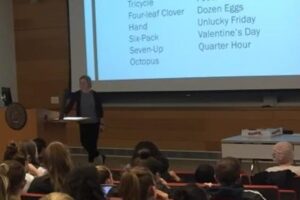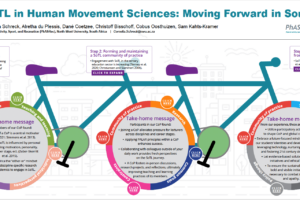ISSOTL 2020 Fellows Spotlight – Marian McCarthy

Dr. Marian McCarthy
Adjunct Senior Lecturer in Education; Retired Vice President for Teaching and Learning and former Director of the Centre for the Integration of Research, Teaching and Learning (CIRTL)
University College Cork (UCC)
Ireland
ISSOTL Region — Europe
What drew you to SoTL? SoTL sends a powerful message to all who teach in the academy that it is equally possible to research teaching, as well as to conduct disciplinary research. Indeed, SoTL is focused on the integration of research, teaching and learning, which is reflected in the very name of our teaching and learning centre: The Centre for the Integration of Research, Teaching and Learning (CIRTL). I found SoTL to be a strategic and sustainable lever in attracting faculty to our professional development courses and workshops. SoTL is inclusive and sends a reassuring message that teaching and learning belong to all who teach, regardless of their disciplinary field. SoTL acknowledges the dual identity of faculty as teachers and researchers and resists a binary approach that pits teaching against research. As director of the accredited programme in teaching and learning in higher education at UCC from 2004-2018, I found that colleagues were able to identify with the SoTL mission since it worked in tandem with their research discipline, inviting them to critique and document their teaching as an intrinsic part of advancing their research. SoTL brought students and their learning into the picture, making it clear that disciplinary understanding emerges primarily through the evidence of student learning- a SoTL imperative.
Another key point that drew me to SoTL was that it nurtured communities of learning and of practice across the university and its disciplines. It became a powerful lever for sharing ideas and strategies and provided a safe platform for peer review and critique. Over time, colleagues realised that it was possible to share their hopes and fears and evidence about student learning and that they could present their findings locally and, later, at conferences and publish them for the benefit of student learning and the advancement of their disciplines. Such was my faith in SoTL that I embedded it in the Learning Outcomes of each of the modules of our accredited programme to Master’s level, ensuring that teaching was made visible and that it maintained parity of esteem with research.
What does being a SoTL Fellow mean to you? It is a badge of honour and a privilege to be a SoTL Fellow. It is also a call to action to continue this learning journey with other Fellows and SoTL advocates across the globe. The fellowship reassures me that I have something to offer and provides opportunities for leadership and mentoring which perpetuate learning for all of us. Being a SoTL fellow gives me a renewed sense of purpose and direction as a retired teacher-researcher. It reminds me that there is a job to be done and that I need to remain focused on at least some of my burning questions: What is the purpose of a university education today? What values should we teach and model? How do we turn teaching into learning? How do we know what our students know and understand? How can we as fellows inspire others to teach well? What is SoTL’s moral imperative? What can it teach us about citizenship and our contribution to society and the well- being and nurturing of all? What contribution can we make as teachers to the education of our students as responsible citizens who can put their knowledge and understanding to good use? Ultimately, being a SoTL Fellow provides me with a framework and a community to begin to address these questions. In short, SoTL invites me to tell the unending story of teaching and learning as it unfolds across our many communities and cultures. It gives me permission to disrupt, to take action and, hopefully, to make a small difference and contribution to the advancement of teaching and learning within, across and beyond the disciplines to impact lives and learning.
What advice would you give to ISSoTL members looking to better engage others in SoTL? I would begin by saying that SoTL is caught as much as it is taught – so live it and model it! If you have a role in faculty or professional development, show colleagues how to do SoTL by sharing its history, its philosophy, and its sound pedagogical baselines, in the work of Boyer, Shulman, Huber, Hutchings, McKinney, Chick, Felten and many others, as well as its variety of effective strategies and practices. Highlight how SoTL has influenced your own practice, providing specific examples of how it works and how it has impacted student learning in your own discipline.
Encourage colleagues to research their teaching by facilitating communities of practice – face to face and virtual communities- where groups can come together to share their stories and their questions about teaching and learning. Make this process real by having an end goal to celebrate the work. For example, work towards an exhibition in which all can be involved and from which all can benefit; the work can be documented and celebrated in face- to- face and/or in virtual presentations and in poster sessions and e-portfolios of effective practice. Ultimately, work towards an ISSoTL conference and show colleagues what this looks like by visiting previous ISSoTL conferences and publications, encouraging colleagues to present and publish in these.
Above all, be inclusive – all disciplines are equally important and all who teach have a voice at the table. Your role as a Fellow, or a SoTL advocate, is not a commanding one entitling you to stand in judgement of the teaching practice of others, but an opportunity to provide feedback and support. In the words of Randy Bass, SoTL is about investigation and not about remediation. Your call is to nurture and encourage colleagues to take one small step to inform and transform their teaching, so that it sings even more in tune with student learning.
Show colleagues the promise and potential of SoTL by providing them with opportunities to get started, in the form of spaces to gather (whether face –to- face or virtual), for example, or by providing resources or funding to enable them to set up their inquiry and conduct some research into their teaching. For example, at UCC, the Vice President for Learning and Teaching hosts the President’s awards for Teaching Excellence and for Innovation. These attract staff to commit to building their teaching profile or to researching a burning question. CIRTL in involved in running and evaluating these initiatives. CIRTL also hosts a highly successful accredited programme where faculty can acquire qualifications in teaching and learning in higher education up to Master’s level. Such qualifications are also linked to the call for promotions at UCC, so that faculty can have their teaching recognised as part of their career progression. CIRTL also provides regular professional development seminars devoted to the hot topics of the day. For example, currently there is a focus on the Connected Curriculum at UCC and CIRTL has organised a series of design workshops to support colleagues to redesign modules and courses to prioritise integrative learning and maximise connections across the disciplines, aligning also with the compelling issues of our time, such as sustainability, equality and civic and community engagement. Such a focus also aligns with the current Strategic Plan of the university and its myriad roles in advancing such elemental issues as education, research, creativity, society, equality, inclusion, entrepreneurship, employment and the public good. My advice in this context is that we can engage others in SoTL when they see that it is meaningful and speaks to the bigger picture of learning in the community and society.
Finally, to engage colleagues in SoTL, bring it all back home to the perspective and practice of each one. Help colleagues to find their own burning questions which will act as real incentives for them to invest in their teaching and engage in SoTL long term. All of us want to teach well, all of us want our students to learn. All of us want our disciplines to be understood and to thrive. All of us want to be part of a community of learning within and beyond the academy; indeed, we are all part of a life-long and life-wide journey of learning. All of us want to change the world – or at least to make a difference. We all have so much in common across the disciplines and the academy! Use this to your advantage and rally the troops under the SoTL banner! If you live the SoTL message, they will follow. Trust your colleagues. The best forms of engagement will come from listening to them and from taking your SoTL direction from them; their stories will inform the direction and promise of SoTL in your institution.




